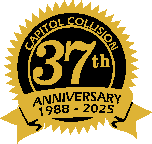Reporting and/or filing an auto insurance claim with your insurance company?
So…you have been in an accident. At this point, regardless of who was at fault, you need to report the accident to your insurance company. This is also known as opening a claim. It is also best to do within the first twenty-four hours of the accident. Your memories will be fresh and if you have a tendency to procrastinate, this makes sure you have done it.
 Always report your own insurance claim. It is best not to let your attorney do it for you. Insurance companies and attorneys mix about as well as oil and water. So don’t let your insurer start off on the defensive. Besides, you are the best source of information.
Always report your own insurance claim. It is best not to let your attorney do it for you. Insurance companies and attorneys mix about as well as oil and water. So don’t let your insurer start off on the defensive. Besides, you are the best source of information.
When you call, don’t waste your time calling your agent. This is not the person you really want to deal with. Their job is to sell and keep your policy updated. At this time you need to be speaking to a claims adjuster. Most companies will provide you with an 800 number for reporting accidents. This will connect you with an adjuster who is best suited to handle the situation. If you do not have the number for accident reporting, check for the company’s main number (almost always listed online) and you will be hooked up with the right person.
This is not the time for placing blame or indicating who was at fault. This is your own company you are talking to and obviously, they want you not to be at fault, but at the same time, you do not want to accidentally say anything that might be used against you. So if asked during the course of the conversation, limit yourself to the facts and do not accept or assign fault. Let the insurance company draw its own conclusions based on the facts. Obviously, if you were hit by a drunk driver who ran a red light and aimed their car directly at yours, the fault is not going to be hard to determine and by giving the facts you basically told them who was responsible for the accident.
They will probably ask for a recorded statement. First of all, you should never consent to do a recorded statement with the other person’s insurance company without making sure you are very clear in your own mind the facts of the accident. Should you “guess” or assume certain details they may be used against you at a later time. But this is your own company, so is there any harm in permitting it? Generally speaking, no. The whole idea of a recorded statement is to firmly place the blame, and hopefully, you will not say something that can be used against you. Your insurer is more interested in making sure that they are not the at-fault party that they are more protective of your statements. Again, stick the facts and do not volunteer any information that is not asked for. Keep your answers short and to the point, as it avoids the tendency to volunteer information.
When reporting your insurance claim ensure that your details are in order.
Listen closely to what the adjustor may be saying. They will sometimes try to restate what you have told them, and occasionally may not have their version correct, or they may try to put words in your mouth (whether intentionally or unintentionally). Always make sure that the adjuster understands what you are saying correctly. If the adjuster misunderstands you, correct them and have them repeat it back. If the adjuster asks you or suggests something to you, that you do not know… don’t guess. Tell them you do not know. You can fill in the blanks later.
When you are asked what happened by your company be sure to give complete details:
- Who was in the vehicle?
- Where were the vehicles, what direction were they traveling, speed of the vehicles, and street names?
- Did you have young children in the vehicle and were they in car seats?
- Was anyone injured? This may be a tricky question at this time. It is possible that injuries may not show up for two to three days following an accident, and if you are calling within 24 hours it may be too early to be certain of injury status. We recommend telling them that you are not certain yet. Obviously, if someone went to the hospital or has confirmed injuries, report these, but also indicate that you do not know the full extent of any injuries.
- Chances are that you do not have an attorney yet, and so it is best not to even mention that you are thinking about it. Attorneys and insurance companies are not always on the same page, and so there is no reason to raise any red flags at this point. Your attorney will notify the insurance company of their representation, wait about talking about that until it happens. If you are asked, you have not decided yet.
During the auto insurance claim process keep notes on what steps you have taken and the details you will need.
We have mentioned before that you should never speak to the other person’s insurance company. It is worth repeating and emphasizing. This is one way that a lot of people make a mistake and totally destroy themselves and their case by accidentally saying the wrong thing. Your statement will be recorded. A lot of personal injury attorneys will never allow their client to make a recorded statement, and some will only allow it under certain circumstances and only if they are present. You will be called by the other person’s insurance company. Tell them politely that you will not make a statement. The adjusters can proceed without it.
Once your claim is called in the adjustor will give you a claim number. Everything is based on the claim number and your body shop will be able to handle the claim from there for you.The team at Capitol Collision Repair will be happy to work with you and your auto insurance company to get your insurance claim handled quickly.
Have you been in an accident? Give us a call to make an appointment 602-253-1630, or Request a FREE estimate.

